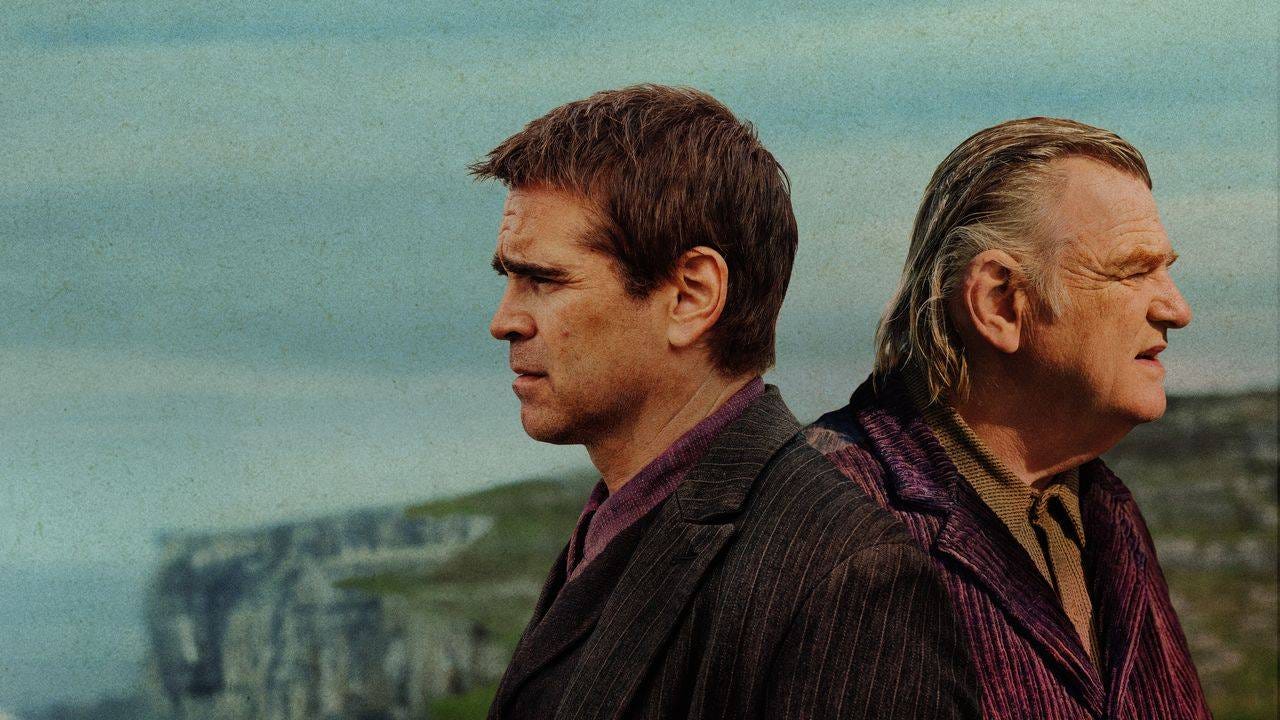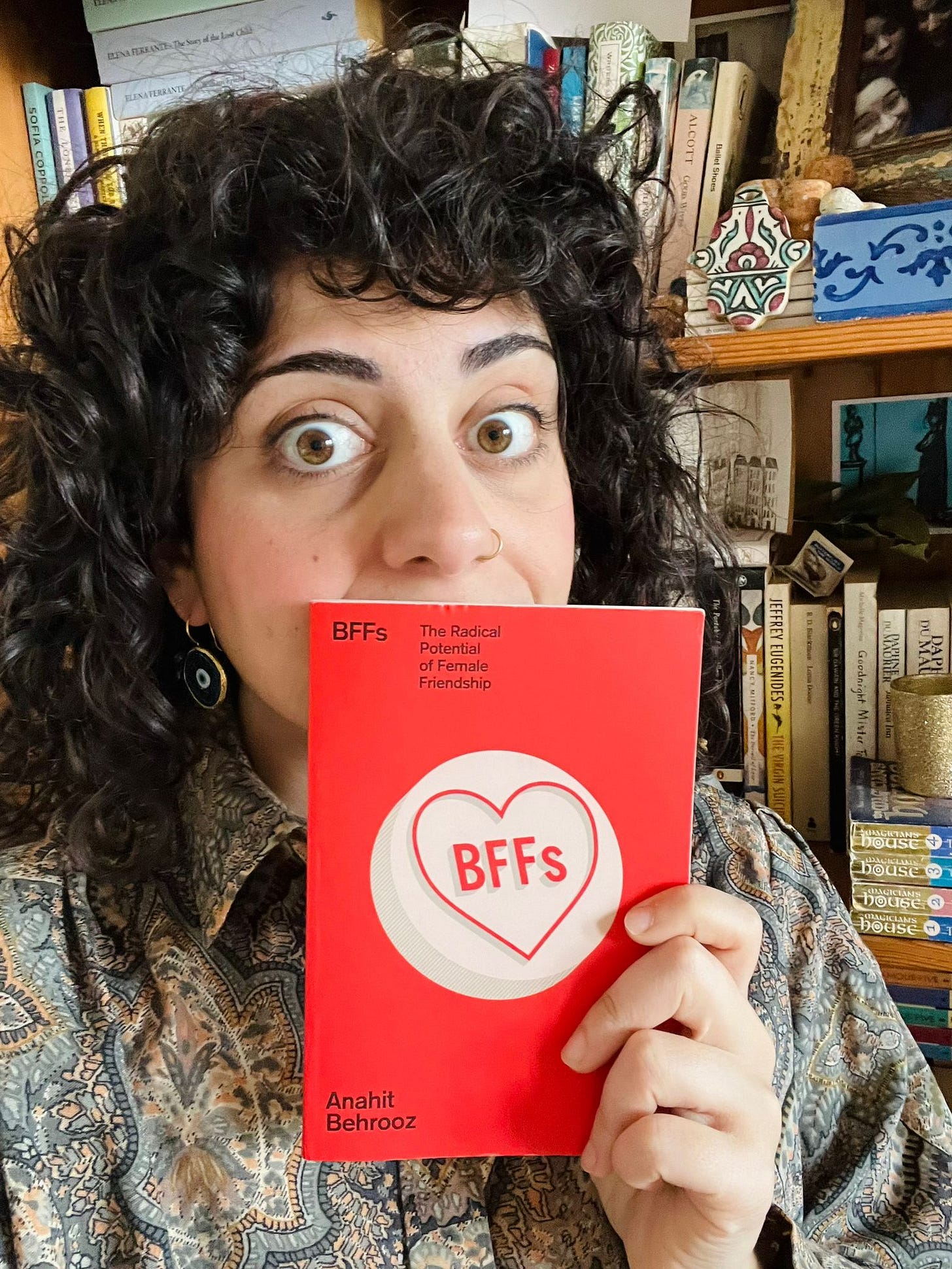The Companion 001: Let's stay together?
Welcome to the first edition of The Companion! Feat. an interview on intimacy and the danger of romantic comedies.
“I have always been unlucky in romance, and lucky in friendship” - Anahit Behrooz, BFFs: The Radical Potential of Female Friendship
I called this newsletter The Companion because I hope it will be just that: something that feels akin to a friend dropping into your inbox each week, shouldering some of the burdens of existential loneliness, sharing with you their highlights and delights from a moment where it really does feel like, culturally speaking, friendship is beginning to be given its due respect.
I first thought about starting a newsletter about friendship deep in the throes of the pandemic. My friends and I had, in some ways, never been closer. Despite the miles between us — I grew up in Edinburgh and many of my closest friends still live in Scotland — we had coalesced in warm and new ways.
On Zoom or WhatsApp, we coached each other through breakups, made bagels, did weekly yoga sessions, and planned workout sessions which often descended into serious chats about the chain of family members impacted by Covid. We started to figure out what we wanted our lives to look like after the pandemic was over (I was convinced it would only impact us for a few months: “There’s no way we’ll still be in lockdown by May!”).
On the flip side, the pandemic also coincided with one of the first times in my life that I experienced something equivalent to a friendship breakup (though definitely not as bad as the breakup in The Banshees of Inisherin). I was heartbroken for months, not wanting to get out of bed on many days, battling some of the darkest thoughts I’ve ever experienced, and struck down by anxiety in a way that I always knew I had the capacity to experience in adulthood, but, until this point, had mostly managed to keep at bay.
So friendship, I decided, was something I wanted, needed, to see, read, and understand more about. Alongside examining the nature and history of my own friendships, I became steadily obsessed with finding journalism, plays, books, films, and TV which treated it with the reverence it deserves.
I even wrote a first draft of this newsletter; a moribund piece of writing about loneliness which I didn’t touch again for many months.
But as with the nature of good ideas thought up by busy people, I got distracted. And it wasn’t until December of 2022 that I pulled out that moribund piece of writing again, using it as the basis of an essay I was asked to pen for iNews on lessons learnt in 2022: “I always longed for a large friendship group, until 2022 when I realised they don’t cure loneliness”.
Quite wonderfully, the piece went a little viral and inspired me to pitch a column on navigating friendship in your twenties and thirties, which I will be writing on a monthly basis for Stylist magazine, and to launch this newsletter, The Companion!
So here we are. At the beginning of what I hope is a beautiful journey. I’m interested in uncovering the culture-makers: creators and artists who are defining how we conceive of friendship at this moment, and wrestling with the prospect of the momentous change needed to reposition friendship in society.
This is a space where I’ll share musings on my own friendships, interviews with people who are creating a new culture of friendship, reflections on pop culture narratives which encompass friendship, expert advice on nurturing your own friendships and much more (if you have a question about friendship you’d like some advice on, fill out the form here!)
In this bumper edition: an expanded interview with Anahit Behrooz, the author of BFFs: The Radical Potential of Female Friendship, who writes so powerfully about the ways in which we can centre friendships in our lives. This book is truly exciting; not only does it capture the zeitgeist, but it also forces the reader to reexamine tenets of friendship that may have been taken for granted, including, of course, our beloved romantic comedies. Read on to find out more!
Anahit Behrooz: ‘We’ve inherited patriarchal structures of intimacy’
Charlie: What triggered your interest in friendship?
Anahit: A lot of it came from my experience of my twenties. I had these very, very close friendships. And then as my twenties went on, I could see the structures in place that were not allowing them to be as close as they were before. So many people around me got married. People started buying houses, moving out, moving around. You could understand that sense of drifting that you're always told is what happens in friendship. It really struck me how structural it was. It wasn't just the case of people moving on, it really was that we were continuing to only pay attention to certain kinds of inherited patriarchal structures of intimacy. I was really interested in thinking about friendship as a very important thing that can emotionally sustain you and can be really beautiful. But also, as something that can act as a form of resistance, that has radical potential.
You write, in relation to marriage, that you were “so unprepared for the ways in which these things still deeply matter”, which I deeply related to. As a kid, I was like, “Oh, my friends will never get married. We're beyond that, we're feminists. That's not going to concern me in my life.”
Yeah, it's not just that people get married, but it's the ways in which they invest in it as a priority. It is important to have different kinds of intimacies and romantic and sexual intimacy should sit alongside everything else. I remember being at a wedding and everyone coupled off. I hadn’t been allowed to invite a plus one. If I was, I would have invited my best friend. But there are certain relationships that are validated and legitimized, and ones that aren't. And of course, if you have that structure in place, then you are going to drift apart from people who are at different stages of life.
“We’re taught about heterosexual romantic love in a way which is very dangerous” - Anahit Behrooz
In what ways do you think we’re conditioned to think about romantic love?
A: We're taught about romantic love, and particularly heterosexual romantic love, in a very dangerous way. I fucking love romantic comedies, but I do think, especially when I was growing up in the nineties, and noughties, there was a sense that you would give everything up, even your own sense of self, for this love. The narratives of rupture that came out of that; the way that you could just be crying in bed for weeks. There was a certain kind of dissolution of the self that was acceptable in a way that it isn't with friendship. We’re taught that that's what's important.
Have you tried in any sort of conscious way to come up with friendship rituals, or ways in which you can mark your friendships?
A: For me, a lot of it is down to less of a ritual and more building your friends into your everyday life. I think the times when I feel close to people, and I feel like the relationship has the status and the value and the happiness of other relationships, is when they are someone that is just integrated into every part of your life; that you will go on errands together, no thoughts just vibe. Things that just don't have to have necessarily a deep ceremonial significance, but that are just part of your life. I find that that is something that I've been trying to do more deliberately.
And finally, a question that I’m asking everyone: do you feel like the culture of friendship has changed in your lifetime?
There has been a change in how we think about women alone, women not in the couple. The pandemic had a really big part to play in that. Because suddenly, people were alone in very particular and rigid ways. It was a crucible. Generally, discourse on the left increasingly is about things like mutual aid and queer community. These are all ideas that resist that very homogenized nuclear unit. That bleeds into culture more and more, and we start to think, what are the forms of community that can act as resistance? Then, with films such as Booksmart, we are increasingly being drawn towards friendship stories and we are realizing that friendship is not something we want to devalue.
Quickfire:
What do you think has been your biggest learning about friendships in your twenties and early thirties? That I want for them to be unstructured and tender.
What is the best thing you've read, listened to, or watched on friendship recently? The Hookup Plan on Netflix, and a film called The Broken Hearts Gallery.
Who is a friend that you appreciate at this moment and why? The two friendships that are most important to my life, my two best friends. We call each other “The Cluster”, which comes from the TV show Sense8. A lot of how I feel about the radical possibilities of friendship are encapsulated in the two of them.
This interview has been edited for length and clarity.
Do you have a question about one of your friendships that you’d like some advice on? Fill out the form here and I might answer it with the help of an expert!






I am so passionate about my friendships - even created my own blog that featured one friend in each published post, a brief but exciting project I worked on for a bit. Will happily be reading more of your content!
Love this and can't wait to hear more !! Feel like I've maintained a (sometimes) rigid idea of what friendship can/should be, working on undo-ing that idea.